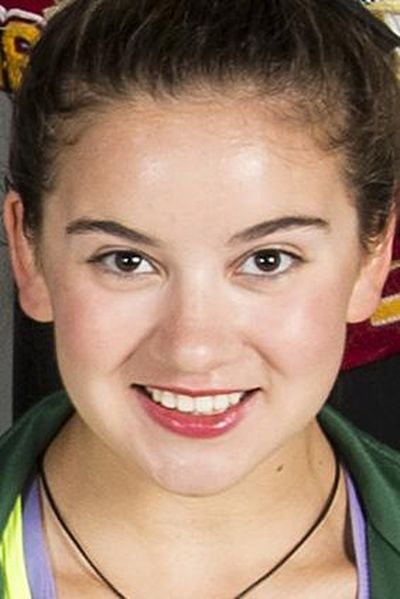Shadle Park’s Audra Spargo stays remarkably positive despite tragedy

Tennis has been a constant in Audra Spargo’s life since she was 11 years old.
She’s spent most of her evenings at the tennis club, where her father coaches her and she strives to improve her game.
In the spring, she’s the No. 1 singles player at Shadle Park. And for three straight seasons, she’s been the district singles champion.
“She’s definitely a player with a lot of potential,” Shadle coach Lindsey Pugh said. “She just goes and goes and goes. She continues to develop. She hasn’t yet had a season where’s she’s dominated the (Greater Spokane) League, but she’s always beaten everyone.”
Spargo opens play today at the State Class 3A girls singles tournament in Kennewick – her third straight state berth.
“I like playing this time of year,” Spargo said. “It’s a little counter-intuitive, but I always play better tennis when I face better competition. That’s what I love about playing at state. You’re pretty much guaranteed to have a great match.”
These last few matches of her junior season will be the final time Spargo represents the Highlanders on a tennis court. Over the summer she will move with her family to Arizona, where she will play her senior season.
It’s a bittersweet parting.
A month ago Spargo lost her mother to a brain aneurysm. Her father believes a change of scenery is in order for his grieving family.
“There are so many memories here, and we’ll be closer to family,” she explained.
At first, Spargo kept her mother’s condition a secret from her teammates. She didn’t want to do anything to upset team chemistry so she carried the burden alone.
“Tennis can be a really serious sport,” she said. “But when all is said and done, life is to be lived. When you’re playing tennis it’s business time. After tennis, you go back to life.
“I’ve had to play a few friends in (United States Tennis Association) matches. Before and after the match we’re great friends, but during the match it’s business. I just thought it was best to keep things separate.”
But tennis also serves as a refuge for when life threatens to give you more than you can bear.
“I marvel at how she’s kept things together,” Pugh said. “I’ve learned a lot about life from her this year.”
“I honestly love competition,” Spargo said. “Life can be really, really hard sometimes. Tennis is different. It’s just lines and a ball. It doesn’t have all of life’s struggles. Everyone has their struggles. Life can be unpredictable. Life can be tough. Tennis is my way of letting go of all that for a while. When I go to the club with my dad, I can let it all go. If I’ve had a really bad day, I can just let it all go.”
And her on-court demeanor was never shaken.
Pugh said she took Spargo aside after her mother passed and told her she didn’t need to play – that she could take as much time as she needed to deal with the traumatic loss.
“She told me ‘No, I have to play,’” the coach explained. “Her mother passed away on a Friday and she played our match the following Tuesday, and she played her best tennis of the season in that match. She needed to play.”
“I wanted the tennis to be where life didn’t exist and everyone was happy and we were all just playing tennis,” Spargo said. “Competition after she passed was hard. It’s so mental, tennis is. You have to fight through it.”
Typically, Pugh said, it was difficult to tell what her player was dealing with once the match started.
“She has a great poker face,” Pugh said. “She always wears sunglasses so you never know what she’s thinking. And she’s all business when she’s on the court.
“Her strength as a person, being an athlete, being a team player has taught me a lot. She has an amazing attitude – she is such a special young woman.”
Tennis has been a special refuge for Spargo, especially over the last month.
“You know that old cliché – whatever doesn’t kill you makes you stronger?” Spargo said. “I really believe that.”
After growing up playing USTA junior tennis, Spargo said she very much wanted to play high school tennis and be a part of a team. At first her teammates were reluctant to hit with her because they could rarely score a point against her, even in practice. But they quickly came to enjoy her spirited sense of humor.
Her father joined the coaching staff as an assistant coach so that he could continue to work with her as a freshman and sophomore.
But this year, things changed. Her father spent time in the hospital with her mother.
“I had to learn how to analyze my own game,” she said. “I couldn’t just go up to my dad and say ‘What am I doing wrong? What do I need to do to fix it?’ l had to do that myself.
“This was a season with a lot of personal growth. I had to take responsibility for my own game.”
Pugh said she’s always been impressed by Spargo’s approach to the game.
“She always has a perspective where she’s in control,” the coach said. “She was playing someone the other day, and I don’t want to name names, but (her opponenet) was making some questionable calls. After she lost the match, I wanted to blame the other girl. Audra wouldn’t have any of it.
“She told me ‘That’s not what lost the game for me.’ She never thinks badly of anybody. She just goes out there and controls what she can control.”
And then there’s her general outlook.
“She’s the funniest player I know,” Pugh laughed. “We are really going to miss her. And I’m not talking about her tennis.”